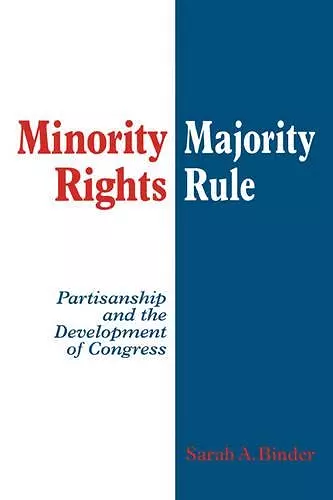Minority Rights, Majority Rule
Partisanship and the Development of Congress
Format:Paperback
Publisher:Cambridge University Press
Published:13th Jun '97
Currently unavailable, and unfortunately no date known when it will be back
This paperback is available in another edition too:
- Hardback£90.00(9780521582391)

Minority Rights, Majority Rules explains why majority parties dominate in the US House of Representatives, while minorities often dominate in the Senate.
Minority Rights, Majority Rules seeks to explain why congressional majorities parties are so powerful in the US House of Representatives and minorities so often dominant in the Senate. Dr Binder explains how partisan battles - fought under rules inherited from the past - have throughout congressional history shaped the creation and suppression of minority rights.Minority Rights, Majority Rule seeks to explain a phenomenon evident to most observers of the US Congress. In the House of Representatives, majority parties rule and minorities are seldom able to influence national policy making. In the Senate, minorities quite often call the shots, empowered by the filibuster to frustrate the majority. Why did the two chambers develop such distinctive legislative styles? Conventional wisdom suggests that differences in the size and workload of the House and Senate led the two chambers to develop very different rules of procedure. Sarah Binder offers an alternative, partisan theory to explain the creation and suppression of minority rights, showing that contests between partisan coalitions have throughout congressional history altered the distribution of procedural rights. Most importantly, new majorities inherit procedural choices made in the past. This institutional dynamic has fuelled the power of partisan majorities in the House but stopped them in their tracks in the Senate.
"This is an extremely interesting book and one in which the author makes a convincing case for her various positions. It will I am sure, be accepted for a long time as an important contribution to the history of the U.S. Congress, to the study of American Congressional Politics, and to our understanding of institutionalization processes in the United States." Allen G. Bogue, H-Net Reviews
"Binder's use of history makes the development of minority party rights come alive." Alison D. Howard, LSS Newsletter
"In an age when partisan politics and congressional gridlock are under attack, Sarah A. Binder's stufy of procedural change in the House of Representatives and the Senate is most timely. Political historians will find this succinct, never overstated study valuable. Scrupulously documented, it is based on a thorough study of congressional sources such as the Congressional Globe and the Congressional Record, as well as works in political science." Donald B. Cole, The Journal of American History
ISBN: 9780521587921
Dimensions: 229mm x 154mm x 16mm
Weight: 388g
256 pages